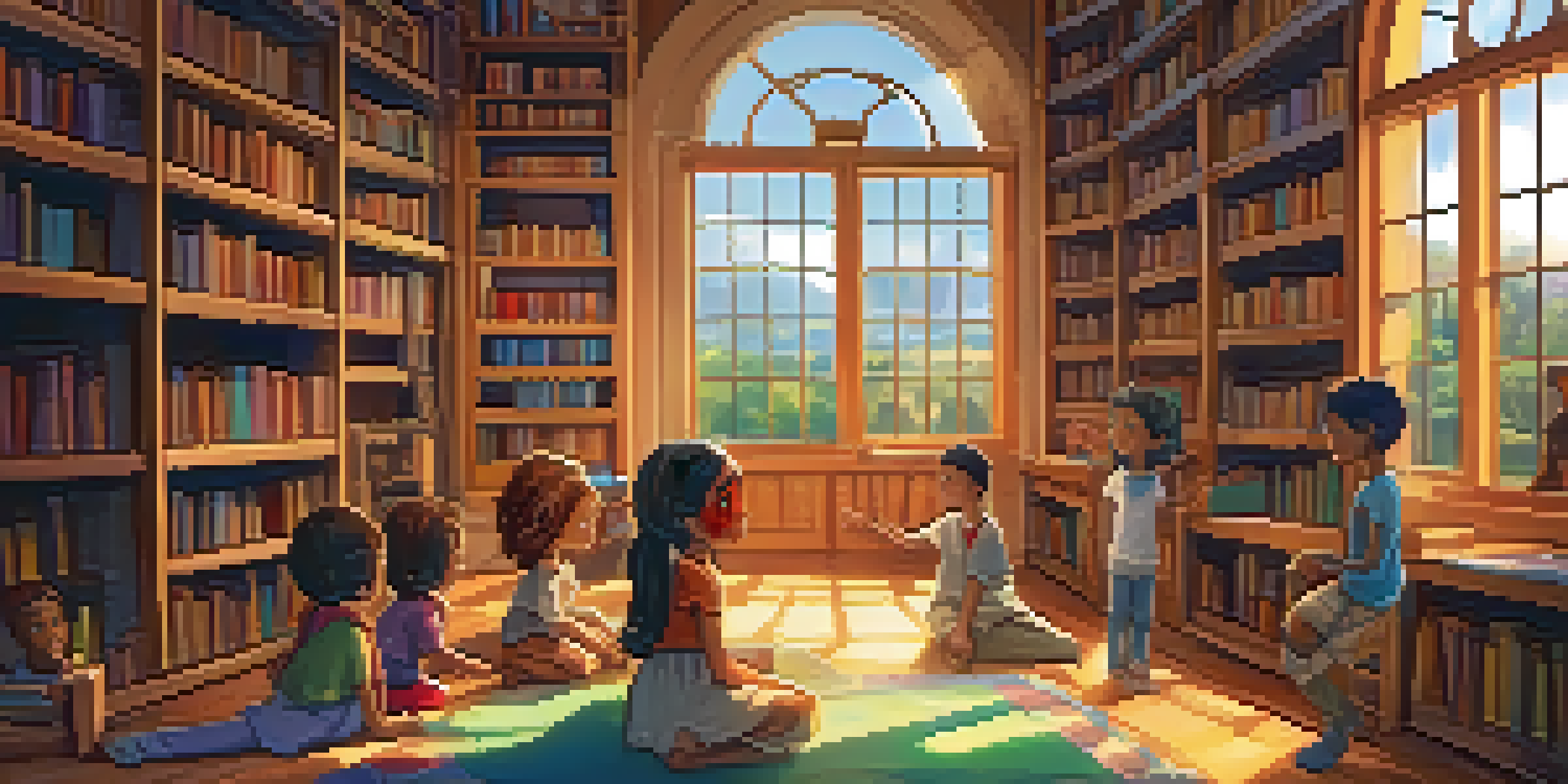The Role of Storytelling in Human Connection and Culture

Understanding Storytelling as a Universal Language
Storytelling transcends geographical and cultural boundaries, acting as a universal language that connects people. From ancient cave paintings to modern-day films, stories have been a means for humans to share experiences and emotions. This shared narrative helps bridge gaps between diverse cultures, fostering empathy and understanding.
Stories are a communal currency of humanity.
Consider how a simple fable or a captivating novel can evoke feelings of joy, sorrow, or nostalgia, regardless of the reader's background. It’s this emotional resonance that makes storytelling a powerful tool for connection. When we hear stories from different cultures, we often find common threads that unite us, reminding us of our shared humanity.
In essence, storytelling is not just about entertainment; it’s about creating a dialogue that allows us to explore different perspectives and experiences. Through this lens, we can appreciate the richness of our global tapestry and the stories that weave us together.
The Role of Storytelling in Cultural Identity
Cultural identity often hinges on the stories passed down through generations. These narratives, whether oral or written, shape a community's values, beliefs, and traditions. For instance, Indigenous storytelling practices not only preserve history but also impart lessons about the relationship between people and nature.

As societies evolve, so too do their stories, adapting to reflect contemporary realities while honoring ancestral roots. This dynamism keeps cultural identities vibrant and relevant. By sharing and celebrating these narratives, communities reinforce their unique identities, fostering pride and belonging.
Storytelling Connects Cultures
Storytelling serves as a universal language that fosters empathy and understanding across diverse cultures.
Ultimately, storytelling acts as a cultural anchor, ensuring that the essence of a community remains intact, even in the face of change. It’s a reminder of where we come from and the values that shape who we are today.
Storytelling as a Tool for Empathy and Understanding
In a world often marked by division, storytelling has the remarkable ability to cultivate empathy. When we immerse ourselves in another's story, we begin to understand their fears, hopes, and dreams. This emotional engagement can dismantle preconceived notions and foster a deeper sense of connection.
The stories we tell ourselves are the stories that shape our lives.
For example, a documentary showcasing the life of a refugee can evoke compassion and understanding, encouraging viewers to see beyond statistics and headlines. It humanizes experiences that may seem distant, reminding us that everyone has a story worth telling.
By sharing our own stories and listening to others, we create a rich tapestry of experiences that promote dialogue and healing. In this way, storytelling becomes a bridge, connecting us to one another in profound and meaningful ways.
The Impact of Digital Storytelling in the Modern World
With the rise of digital media, storytelling has taken on new forms and platforms, making it more accessible than ever. From social media posts to podcasts and video content, digital storytelling allows individuals to share their narratives with a global audience. This democratization of storytelling empowers voices that may have otherwise gone unheard.
For instance, platforms like YouTube and TikTok have given rise to a new generation of storytellers who share their experiences in creative ways. These digital narratives can spark movements, raise awareness, and foster connections across diverse audiences. The immediacy of online storytelling also allows for real-time engagement, creating communities around shared interests and experiences.
Cultural Identity Through Narratives
Cultural identity is shaped and preserved through stories passed down generations, reinforcing community values and traditions.
However, with this accessibility comes the responsibility of authenticity and respect. As we navigate this digital landscape, it's essential to honor the stories of others and recognize the power they hold in shaping perceptions and driving cultural change.
The Therapeutic Power of Storytelling
Storytelling serves not just as a means of connection but also as a powerful therapeutic tool. Sharing personal stories can aid in processing emotions and experiences, providing a sense of relief and validation. This is often seen in therapy settings where individuals recount their journeys to heal from trauma.
For example, writing a personal narrative can empower someone to reclaim their story and find strength in vulnerability. This therapeutic aspect extends beyond individual experiences; it can foster community healing when shared in group settings, allowing others to relate and support one another.
In this way, storytelling becomes a catalyst for transformation, enabling both individuals and communities to navigate challenges and celebrate resilience. It highlights the importance of voice in the healing process and the profound connections that emerge from shared narratives.
The Role of Storytelling in Education
In educational settings, storytelling is a dynamic tool that enhances learning and retention. By framing lessons within narratives, educators can engage students’ imaginations and make complex concepts more relatable. This approach not only aids comprehension but also fosters a love for learning through engaging stories.
For instance, teaching history through personal narratives or historical fiction can bring the past to life, allowing students to connect emotionally with the material. It creates an immersive experience where students can empathize with historical figures and understand their motivations.
Digital Storytelling's New Era
The rise of digital platforms has democratized storytelling, empowering diverse voices and creating global connections.
Moreover, storytelling encourages critical thinking and creativity, skills essential for navigating today’s world. By inviting students to craft their own stories, educators empower them to express their ideas and perspectives, nurturing a generation of thoughtful storytellers.
The Future of Storytelling in a Globalized World
As we move further into a globalized world, the landscape of storytelling continues to evolve. The blending of cultures through technology and travel presents both opportunities and challenges for storytelling. On one hand, it fosters collaboration and innovation; on the other, it raises questions about cultural appropriation and authenticity.
Looking ahead, the challenge will be to honor the unique narratives of diverse cultures while embracing the interconnectedness of our global community. This requires a mindful approach to storytelling that respects origins and celebrates diversity, allowing for richer, multifaceted narratives.

The future of storytelling promises to be an exciting journey, where voices from every corner of the globe can share their truths. As we navigate this landscape, we must remain committed to storytelling's power to connect, heal, and inspire.